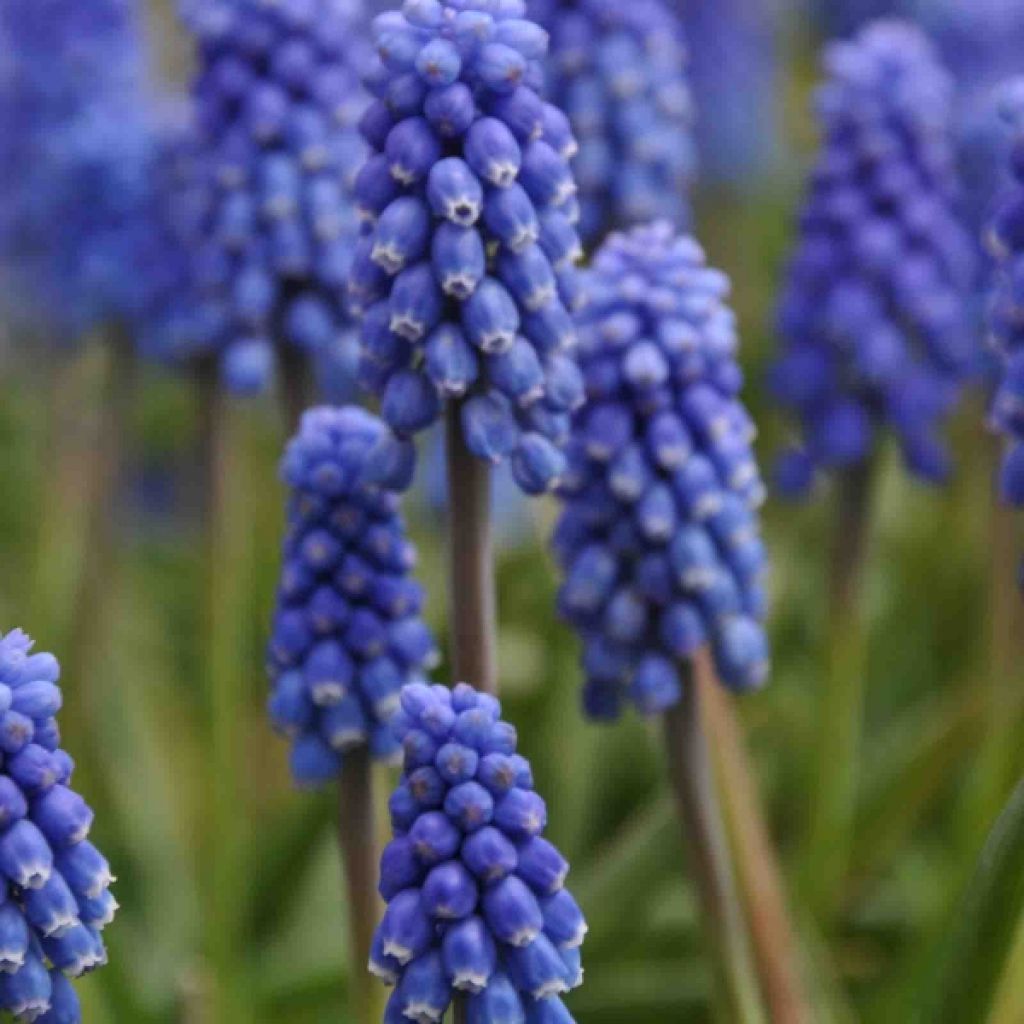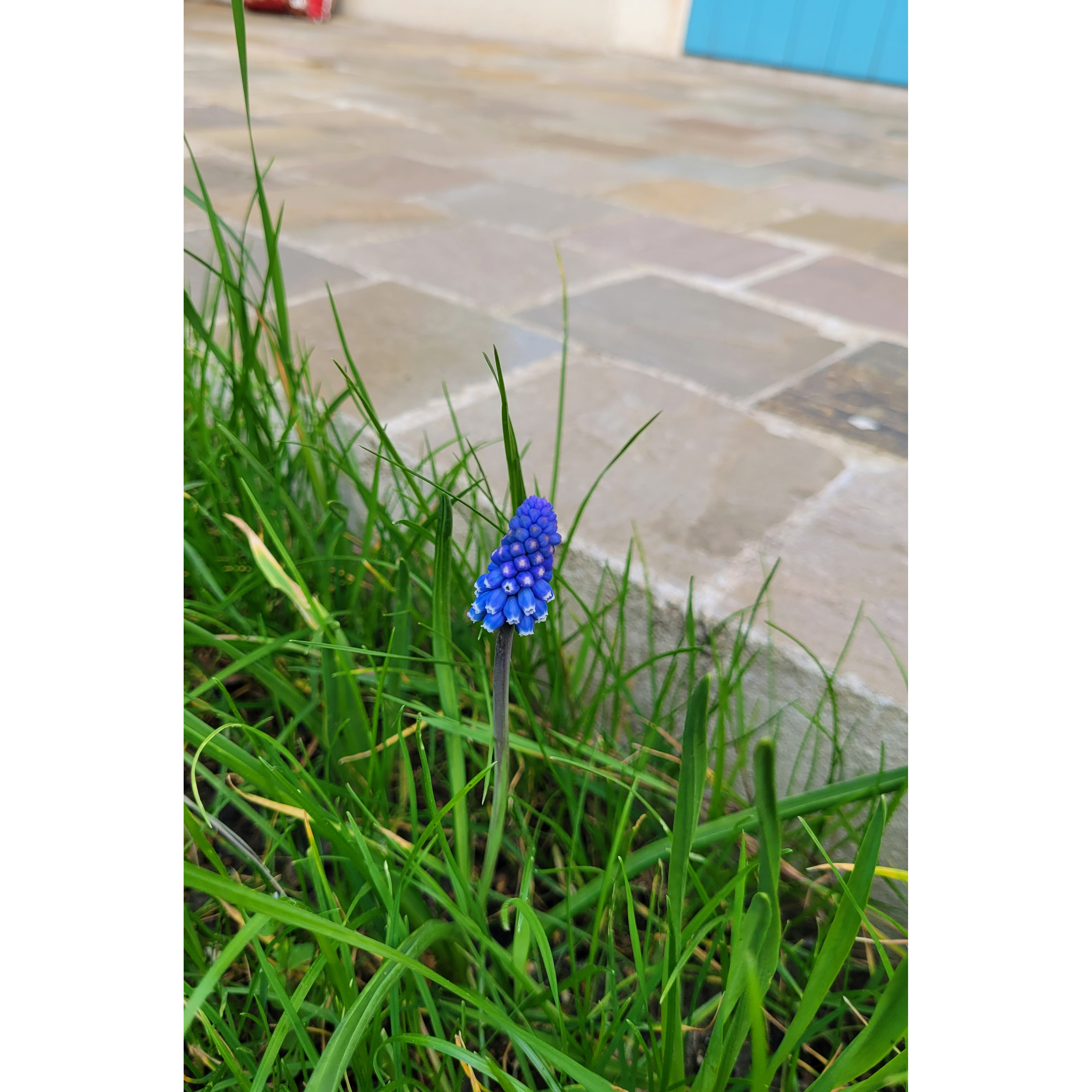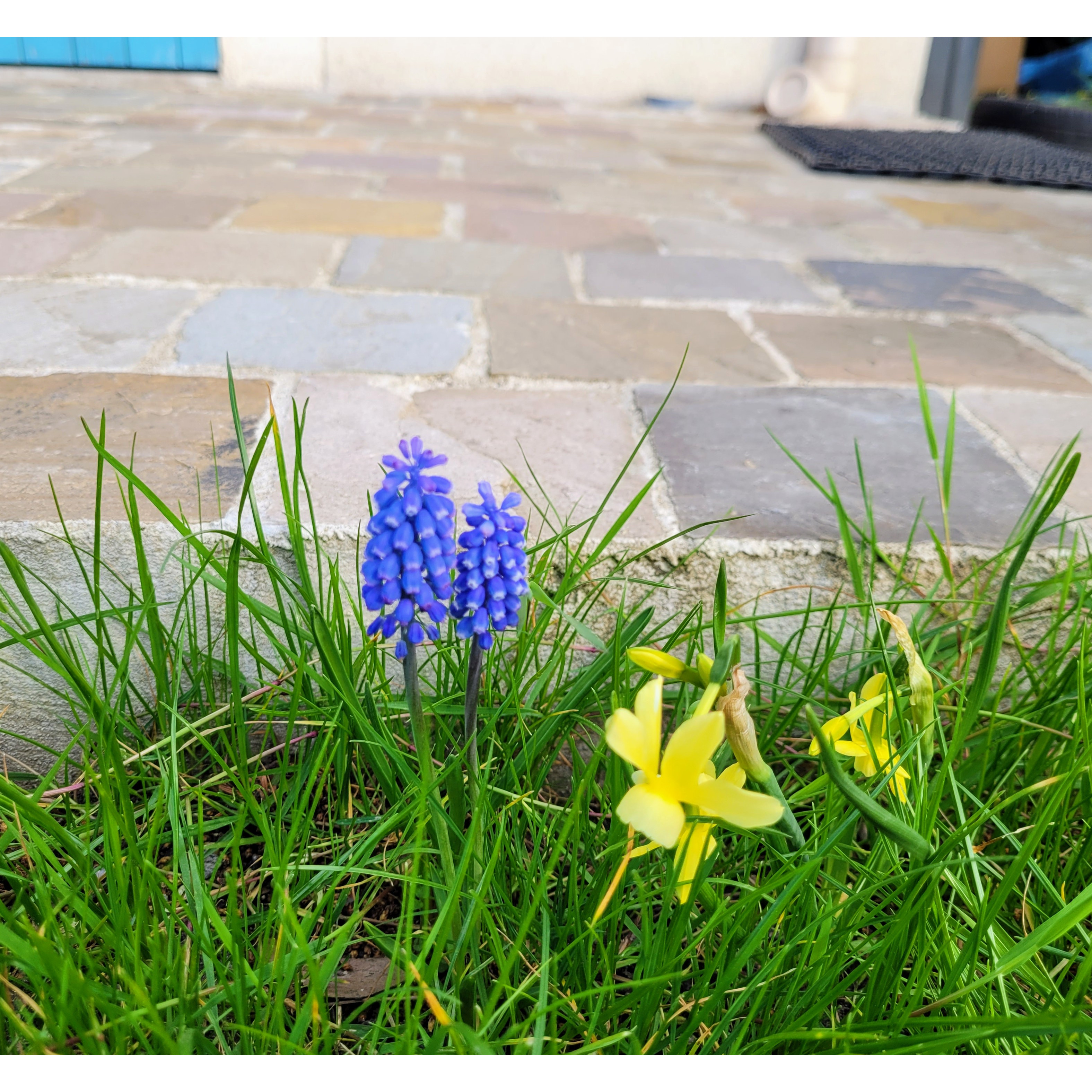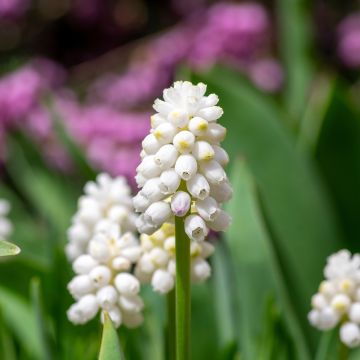

Muscari armeniacum Dark Eyes - Grape Hyacinth
View more pictures
Hide images

Mounira B.

Muscaris planted at the beginning of March, shoots appeared only 1 month later.
Mounira B. • 95 FR

Mounira B.

Muscaris planted at the beginning of March, shoots appeared after only 1 month.
Mounira B. • 95 FR
Muscari armeniacum Dark Eyes - Grape Hyacinth
Muscari armeniacum Dark Eyes
Armenian Grape Hyacinth, Garden Grape-hyacinth
It was a first for me in terms of planting bulbs: Kaufmanniana Early Harvest botanical Tulips, combined with Twinkling Yellow Daffodils and Dark Eyes Muscari sarmeniacum planted in mid-November. Very happy with the result: all the bulbs have flowered, a real delight for the eyes (potted culture on the balcony)!
Sam, 08/04/2024
Special offer!
Receive a €20 voucher for any order over €90 (excluding delivery costs, credit notes, and plastic-free options)!
1- Add your favorite plants to your cart.
2- Once you have reached €90, confirm your order (you can even choose the delivery date!).
3- As soon as your order is shipped, you will receive an email containing your voucher code, valid for 3 months (90 days).
Your voucher is unique and can only be used once, for any order with a minimum value of €20, excluding delivery costs.
Can be combined with other current offers, non-divisible and non-refundable.
Why not try an alternative variety in stock?
View all →This plant carries a 6 months recovery warranty
More information
We guarantee the quality of our plants for a full growing cycle, and will replace at our expense any plant that fails to recover under normal climatic and planting conditions.

Would this plant suit my garden?
Set up your Plantfit profile →
Description
Muscari armeniacum Dark Eyes is a hybrid variety of uncertain origin, distinguished by its small urn-shaped flowers which are deep cobalt blue at the beginning of flowering, with a white ring at the tip when mature. The nectar-rich, slightly fragrant inflorescence appears in the form of a dense and conical cluster emerging from a tuft of grassy foliage in March. This small bulbous plant rests in summer, unaffected by heat. An ideal choice for creating beautiful blue waves sprinkled with white among spring bulbs with yellow flowers.
Probably derived, among others, from Muscari armeniacum, 'Dark Eyes' is a spontaneous hybrid found in the wild in 1969, in a region north of the Caucasus. It belongs to the asparagus family. This small bulbous plant produces a basal rosette of long, very narrow, light and vibrant green leaves. Each rosette produces 3 to 5 flowering stems on a mature and well-developed bulb. The flowering stems are 15 to 20 cm (6 to 8in) tall and bear 20 to 40 small urn-shaped flowers, initially a perfectly uniform deep cobalt blue, tightly packed in a compact cluster 10 cm (4in) tall. The white ring encircling the "neck" of each small flower appears late, before fading to a pinkish tone. The fertile flowers located higher up in the cluster are a slightly lighter blue. After pollination, fruits form containing numerous round and black seeds that germinate very easily.
Muscari is an unassuming but versatile and very useful plant in a garden, or for decorating houses without gardens. Its great resistance to cold, drought, and shade allows it to be used in many situations: in the undergrowth, at the base of trees, as a border to emphasize the design of a pathway, in a rockery with heathers for example, or in Japanese style gardens. It also grows very well in pots, on a window or balcony. It is so accommodating that it will forgive you if you forget to water it and thrive in neglected gardens or weekend gardens. Its blue flowers are very beautiful alongside the yellow trumpets of daffodils, forget-me-nots, fragrant clusters of early blue hyacinths (Blue Pearl, Delft Blue), or the pink and red cups of triumph tulips.
Report an error about the product description
Plant habit
Flowering
Foliage
Botanical data
Muscari
armeniacum
Dark Eyes
Hyacinthaceae
Armenian Grape Hyacinth, Garden Grape-hyacinth
Cultivar or hybrid
Other Muscari
View all →Planting and care
Plant your muscari as soon as possible in a well-drained, loose soil at a depth of 8 cm (3in) (Bulbs should be covered with twice their height of soil). Space the bulbs 8 cm (3in) apart, making sure they do not touch. Choose a sunny exposure for better flowering. Muscari armeniacum is undemanding on soil type and perfectly hardy in all regions, even those dry in summer. Divide the bulbs every 4 years at most. If you are growing it in pots, make sure to water it regularly and feed after flowering for the bulb to replenish its reserves.
Planting period
Intended location
Care
-
, onOrder confirmed
Reply from on Promesse de fleurs
Haven't found what you were looking for?
Hardiness is the lowest winter temperature a plant can endure without suffering serious damage or even dying. However, hardiness is affected by location (a sheltered area, such as a patio), protection (winter cover) and soil type (hardiness is improved by well-drained soil).

Photo Sharing Terms & Conditions
In order to encourage gardeners to interact and share their experiences, Promesse de fleurs offers various media enabling content to be uploaded onto its Site - in particular via the ‘Photo sharing’ module.
The User agrees to refrain from:
- Posting any content that is illegal, prejudicial, insulting, racist, inciteful to hatred, revisionist, contrary to public decency, that infringes on privacy or on the privacy rights of third parties, in particular the publicity rights of persons and goods, intellectual property rights, or the right to privacy.
- Submitting content on behalf of a third party;
- Impersonate the identity of a third party and/or publish any personal information about a third party;
In general, the User undertakes to refrain from any unethical behaviour.
All Content (in particular text, comments, files, images, photos, videos, creative works, etc.), which may be subject to property or intellectual property rights, image or other private rights, shall remain the property of the User, subject to the limited rights granted by the terms of the licence granted by Promesse de fleurs as stated below. Users are at liberty to publish or not to publish such Content on the Site, notably via the ‘Photo Sharing’ facility, and accept that this Content shall be made public and freely accessible, notably on the Internet.
Users further acknowledge, undertake to have ,and guarantee that they hold all necessary rights and permissions to publish such material on the Site, in particular with regard to the legislation in force pertaining to any privacy, property, intellectual property, image, or contractual rights, or rights of any other nature. By publishing such Content on the Site, Users acknowledge accepting full liability as publishers of the Content within the meaning of the law, and grant Promesse de fleurs, free of charge, an inclusive, worldwide licence for the said Content for the entire duration of its publication, including all reproduction, representation, up/downloading, displaying, performing, transmission, and storage rights.
Users also grant permission for their name to be linked to the Content and accept that this link may not always be made available.
By engaging in posting material, Users consent to their Content becoming automatically accessible on the Internet, in particular on other sites and/or blogs and/or web pages of the Promesse de fleurs site, including in particular social pages and the Promesse de fleurs catalogue.
Users may secure the removal of entrusted content free of charge by issuing a simple request via our contact form.
The flowering period indicated on our website applies to countries and regions located in USDA zone 8 (France, the United Kingdom, Ireland, the Netherlands, etc.)
It will vary according to where you live:
- In zones 9 to 10 (Italy, Spain, Greece, etc.), flowering will occur about 2 to 4 weeks earlier.
- In zones 6 to 7 (Germany, Poland, Slovenia, and lower mountainous regions), flowering will be delayed by 2 to 3 weeks.
- In zone 5 (Central Europe, Scandinavia), blooming will be delayed by 3 to 5 weeks.
In temperate climates, pruning of spring-flowering shrubs (forsythia, spireas, etc.) should be done just after flowering.
Pruning of summer-flowering shrubs (Indian Lilac, Perovskia, etc.) can be done in winter or spring.
In cold regions as well as with frost-sensitive plants, avoid pruning too early when severe frosts may still occur.
The planting period indicated on our website applies to countries and regions located in USDA zone 8 (France, United Kingdom, Ireland, Netherlands).
It will vary according to where you live:
- In Mediterranean zones (Marseille, Madrid, Milan, etc.), autumn and winter are the best planting periods.
- In continental zones (Strasbourg, Munich, Vienna, etc.), delay planting by 2 to 3 weeks in spring and bring it forward by 2 to 4 weeks in autumn.
- In mountainous regions (the Alps, Pyrenees, Carpathians, etc.), it is best to plant in late spring (May-June) or late summer (August-September).
The harvesting period indicated on our website applies to countries and regions in USDA zone 8 (France, England, Ireland, the Netherlands).
In colder areas (Scandinavia, Poland, Austria...) fruit and vegetable harvests are likely to be delayed by 3-4 weeks.
In warmer areas (Italy, Spain, Greece, etc.), harvesting will probably take place earlier, depending on weather conditions.
The sowing periods indicated on our website apply to countries and regions within USDA Zone 8 (France, UK, Ireland, Netherlands).
In colder areas (Scandinavia, Poland, Austria...), delay any outdoor sowing by 3-4 weeks, or sow under glass.
In warmer climes (Italy, Spain, Greece, etc.), bring outdoor sowing forward by a few weeks.

































